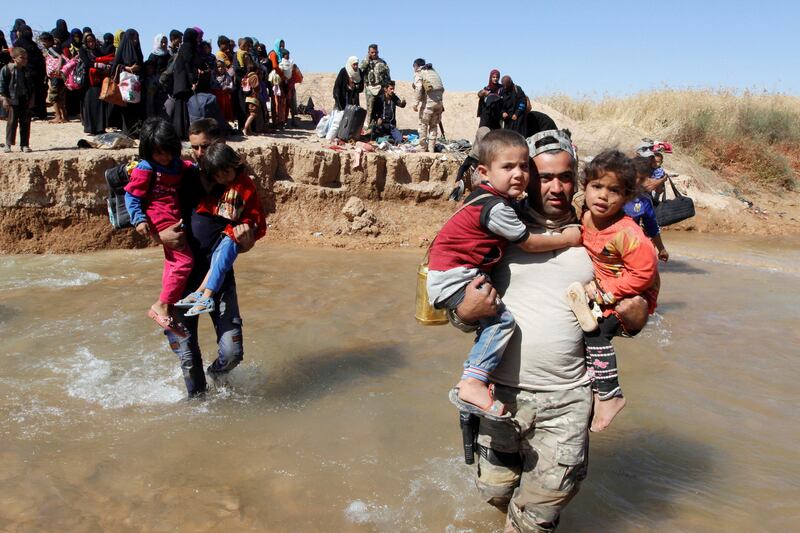The United Nations has warned that displaced Iraqi civilians are facing a "protection crisis" as the battle against ISIL extremists continues.
More than 5.4 million civilians have been displaced in Iraq since 2014.
"Protection remains our over-riding concern," Lise Grande, the UN humanitarian coordinator for Iraq, said on Monday. "Humanitarians are deeply worried about incidents of collective punishment, restrictions on free movement, evictions, forced returns and sexual exploitation and violence, including in emergency sites and camps."
On Thursday last week, Iraqi prime minister Haider Al Abadi declared victory over ISIL in the northern town of Hawija, one of two enclaves in the country still held by ISIL extremists.
Several hundred suspected ISIL fighters surrendered to Kurdish authorities last week after the extremists lost Hawija, a Kurdish security official said on Tuesday. The suspects were part of a group of men who fled towards Kurdish-held lines when Iraqi forces captured ISIL’s base in the town.
________________
Read more:
[ Fallout from Kurdish referendum could hurt efforts to help country's displaced ]
[ Trapped in Syria's Raqqa, civilians become human shields for ISIL ]
[ Analysis: Iraq parliament moves towards pre-election showdown ]
[ Battle to remove ISIL from Hawija could unlock further sectarian tensions ]
________________
Hawija was an insurgent bastion during the US-led invasion of 2003, earning it the nickname "Kandahar in Iraq" because of the ferocious resistance the town put up, similar to that of the Taliban stronghold in Afghanistan.
ISIL's last remaining territory in Iraq is now a stretch along the western border with Syria which includes the border town of Al Qaim.
While fighting in and around the Hawija and other areas of Kirkuk province is now coming to an end, the UN says the country is still facing a "protection crisis".
"Nothing is more important than protecting the civilians who have been impacted by the conflict," Ms Grande said, adding that "international humanitarian law is clear. Everything must be done to ensure people are safe and have access to the assistance they need”.
Ms Grande said that millions of Iraqis had been helped to safety and protected by Baghdad's central government and the Kurdistan Regional Government during the battle to retake large swathes of the country from ISIL. But, she added, it was "vitally important" that the government continued to "fully investigate any violation of humanitarian principles and report of human rights abuses in a transparent and accountable manner".
Allegations of human rights abuses have been levied against several pro-government forces fighting ISIL, particularly the Hashed Al Shaabi, a mainly Shiite militia umbrella group that has a track record of torturing and killing Sunni civilians.
“We are deeply concerned by pressures sometimes exerted on humanitarian workers," said Ms Grande. "Every time we’re asked to do something which violates principled engagement we immediately raise the issue with authorities — and we keep raising the issues until there is resolution."
The humanitarian coordinator said the challenges facing humanitarian workers in Iraq were huge.
“There are heartbreaking cases of children, the elderly and disabled people being separated from their families. Hundreds of thousands of people, including tens of thousands of very young children, have been exposed to extreme danger, stress, and trauma and will require years of specialised support and care."
“That night we walked 5 hours. My 7-year-old son was hit by a bullet + still had to walk. He needs surgery." #Hawijahttps://t.co/0uCoHcPV0q pic.twitter.com/oy4tNqiJtC
— IOM Iraq (@IOMIraq) October 8, 2017






